FROM ‘HIGH RISK’ TO HIGHLY SUCCESSFUL
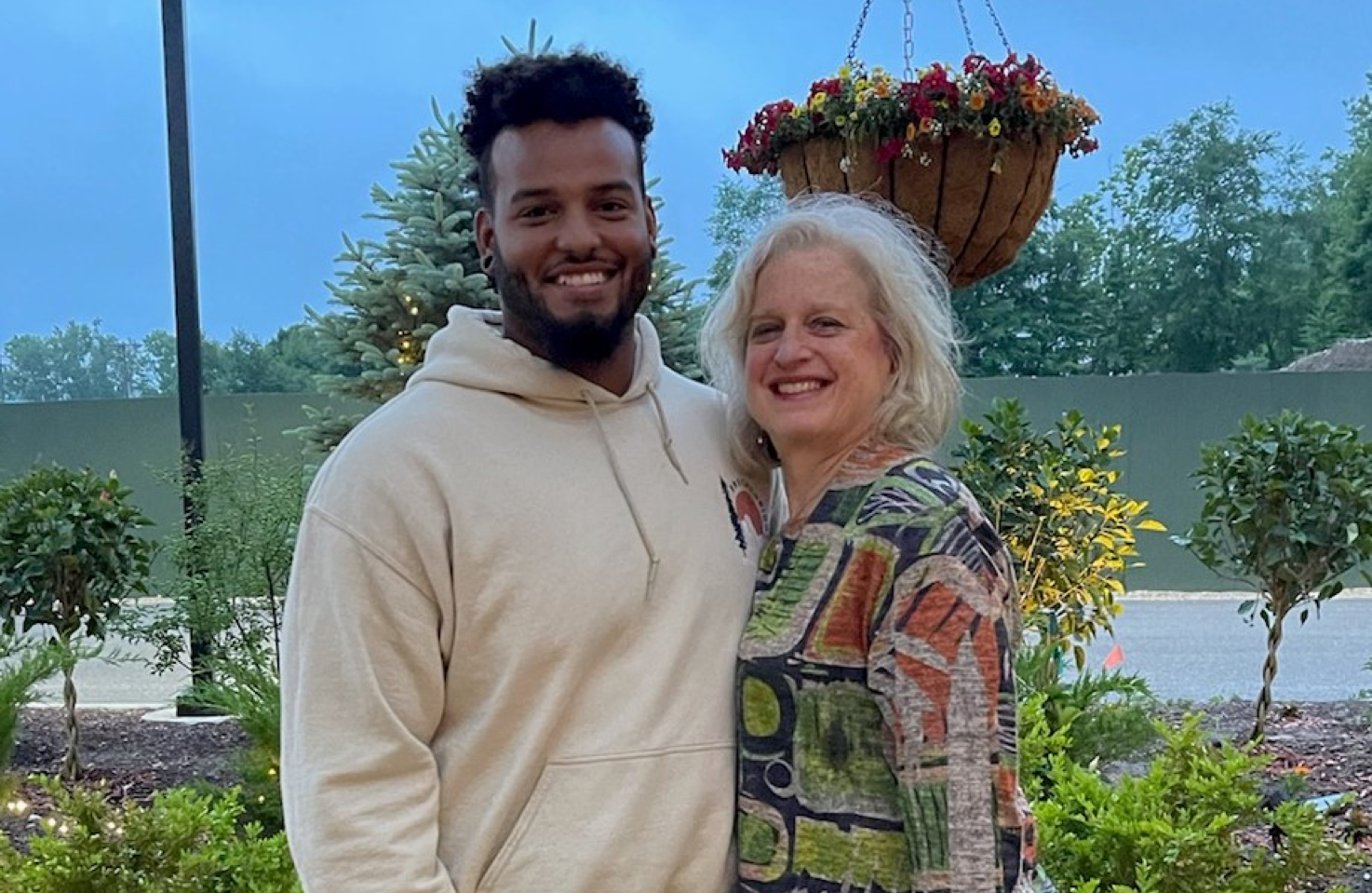
It’s been more than ten years that Jonathan Calderon graduated from Danbury High School. Today he’s got a great job, works out every day and looks forward to a bright future in the construction business. But things weren’t always easy for Calderon, now 29. His family moved to the United States from the Dominican Republic when he was five years old, just about the time his parents decided to divorce. This meant moving from New Haven to Danbury and frequently changing schools. By the third grade, Calderon was labelled a “high risk” student: he was in danger of failing school.
That all changed when he met Judy Coco, a longtime mentor with Danbury Schools and Business Connection (DSABC). For the next eleven years – from third grade to high school graduation, Coco made a commitment to meet with Calderon once a week at school and offer support and guidance. Calderon says that her constant presence made all the difference.
“I remember not knowing why I had a mentor,” Calderon said recently from his Danbury home. “All I knew was I was missing recess and lunch. I was rebelling a little.”
But after teaching Coco how to throw hoops and play boards games, Calderon softened his stance and accepted the stability and continuity that he had been missing. Despite her busy life with her own children and a corporate job that required frequent travel, Coco made mentoring Calderon one of her top priorities. Calderon grew to understand that he could count on her.
“She was like a second mom to me, and she helped change my life. Who knows where I would be,” said Calderon, crediting DSABC as being a vital component to his personal and professional growth. “The program has a sense of actual, genuine caring of another human being. Judy was there not because she had to be there, but to try to guide me. It meant a lot to me, even when I wasn’t aware.”
Calderon, who hopes to someday mentor a student and give back what was given him, said he appreciates the time that Coco put into making him a better person. He said it’s a gift for someone to be able to reach a child enough to change their perspective and circumstances.
“You have to know that kids will be kids,” Calderon said. “You have to want to help with development. It has to be in you. You have to know how you were at that age. Other than that, I look at kids as human beings. You just talk to them. Judy has a lot of patience and had a lot of patience with me. God bless her.”
Coco joined DSABC because she wanted to contribute to benefit someone in the community and said that seeing a positive change in Calderon wasn’t something she had to wait for too long.
“I showed up one day when he was in fourth grade, and he didn’t look good,” she remembered. “He was burning with fever, so I took him to the nurse’s office. He told her ‘Mrs. Coco told me I couldn’t miss any school.’ So, even though he woke up sick, he was determined to go to school. He still has that drive and determination.”
A real turning point, however, was during Calderon’s sophomore year in high school. Calderon, who had made the school wrestling team, turned his efforts to things that matter most and with Coco’s help left the high school drama behind, choosing to focus on mapping out his future. “We started talking about life, about morals and family things. I got more personal about stuff I went through when I was younger. I looked at Judy as not just a mentor, but as a friend and someone I could trust,” Calderon said.
Coco also stepped in as a liaison between the schools and Calderon’s mother due to a language barrier, which put Calderon at ease and made it easier for teachers to follow up on his progress. Despite the fact that Calderon has long since finished with school and is a “graduate” of DSABC, he and Coco have made an effort to stay in touch and recently had dinner together.
“It amazed me his confidence and determination,” Coco said. “He’s got goals and plans. He’s much more talkative and smiles a lot more. He’s into fitness and he’s still a gentleman.
“The most rewarding part of this program for me has been seeing Jonathan and who he is today. Just to see how he has grown. He went from having no goals and no determination to being someone who can stand on his own. He is like one of my sons, and I feel so good about the person he has become.”
I DID MAKE AN IMPACT
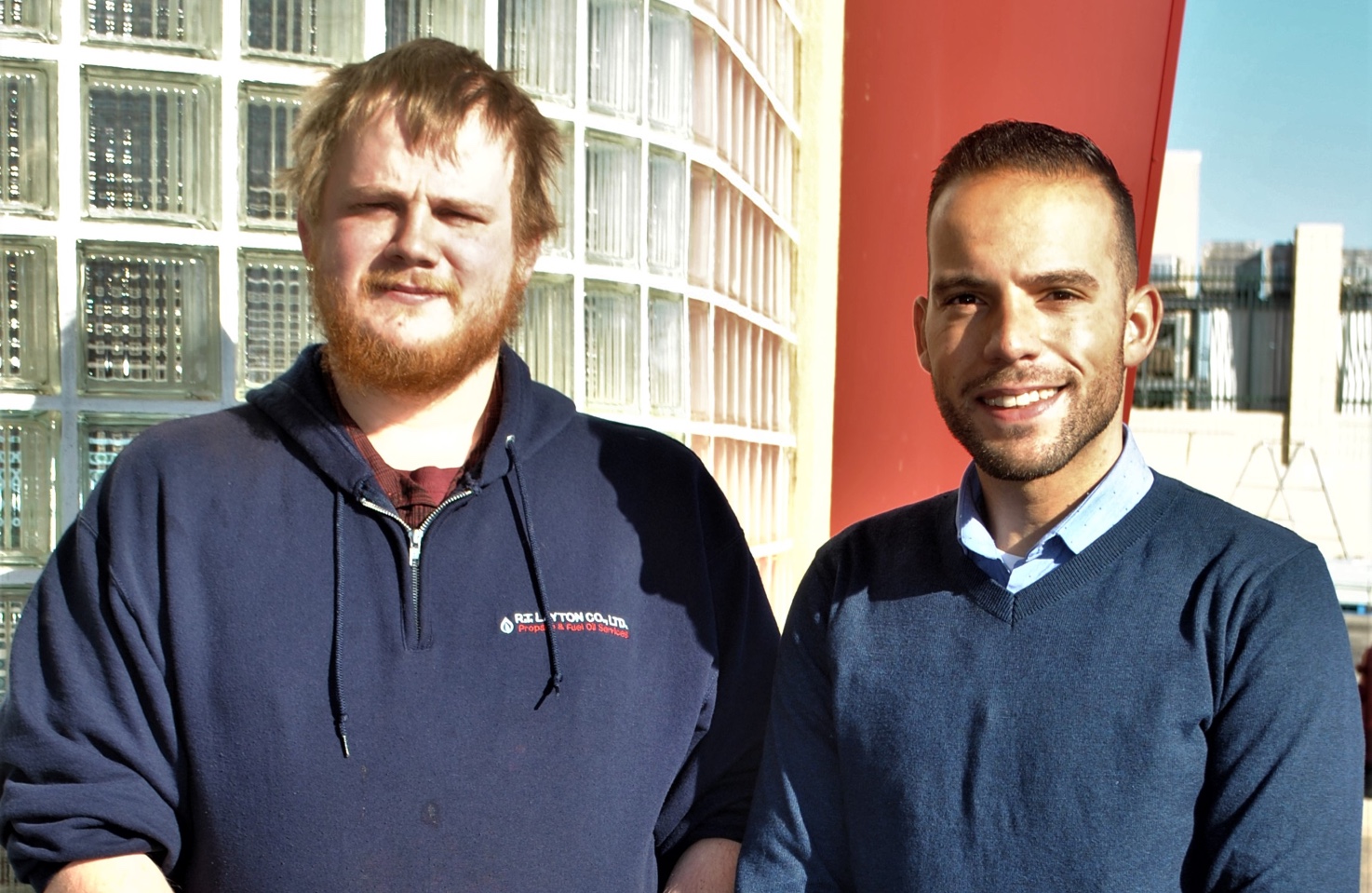
For three years, Farley Santos served as a mentor in the Danbury Student and Business Connection (DSABC) and met with high school student Dylan McIlveen once a week to talk, give advice, but mostly just to listen. Santos said the experience was a positive one, but he often wondered if he had made a difference in Dylan’s life.
It wasn’t until Dylan graduated from Henry Abbott Technical High School in 2015, that Santos realized that his positive influence and commitment had helped change Dylan’s life for the better.
“When Dylan graduated he gave me a plaque that read: ‘World’s Best Friend and Mentor’ with his name and year. It hangs in my office with a photo of us at the DSABC breakfast,” Santos said. “That’s my proudest moment. This was more than I thought it was. I did make an impact.”
Dylan first participated in a mentoring program as a first grader in New Milford schools. A brief move with his family to New York left him without a mentor for a few years. When he returned to the Danbury area, he was able to connect with DSABC and eventually he met Santos.
Santos remembers mentors coming to school when he was a student, but he never had the opportunity to have one. Santos, who served on the Danbury Board of Education and now sits on the City Council, thought about mentoring a lot, but it wasn’t until he worked at Savings Bank of Danbury that he was inspired by a colleague; SBD also encourages employees to participate in community outreach.
“I thought it would be a noble thing to make an impact on a young person. It’s a way to be a role model, and I’m grateful they allow us to do this,” Santos said. “Since it was my first time mentoring, I didn’t know what to expect. We met in the library and would just talk. I shared my experiences when I was a student at Abbott.”
Dylan, who now lives in Torrington and is working full time, said his first impression of Santos was that he was nice.
“It’s always weird meeting mentors,” Dylan said. “After a while it was like talking to another friend. I tend to ball up everything and then get to the point where it breaks, and I shut down. Having a mentor, you can vent about things. It’s nice to have an outsider’s view who doesn’t know your family and talks without taking someone’s side. After a while, you’re just friends.”
Dylan said he didn’t even mind that there was some stigma attached to his having a mentor. After a while, other students were somewhat envious and even joined in his meetings with Santos.
Dylan’s longtime friend from high school, Chris Nelson, said he thinks having a mentor was the best thing for his friend.
“When he came back he was a lot more happy,” Nelson said. “It’s impacted him in a positive way. It’s good that Dylan has someone like Farley.”
Dylan said the best part of his DSABC experience is that he made a lifelong friend. Because he had to communicate with Santos through his school’s social worker, he said graduation was a liberating moment for him and his mentor.
“We became friends on Facebook. We were outside of the program friends now,” Dylan said. The two men meet once or twice a year now, but they keep in touch on social media and by texting.
While Dylan doesn’t yet mentor because he’s busy establishing himself on a career path, he likes to be a friend whenever he sees someone in need.
“It takes time to get to know a person and most people don’t take the time,” said Dylan.
Santos said sometimes meeting someone new, especially a student who may have difficulty expressing himself or herself, can be awkward, but he advises new mentors to be patient, and most importantly, just be there.
“You have to give it time,” Santos said. “It allowed me to view the world through different eyes. Life is different for everybody. Lower your expectations, it’s not immediate. At the end you realize you’ve been a positive influence the whole time.”
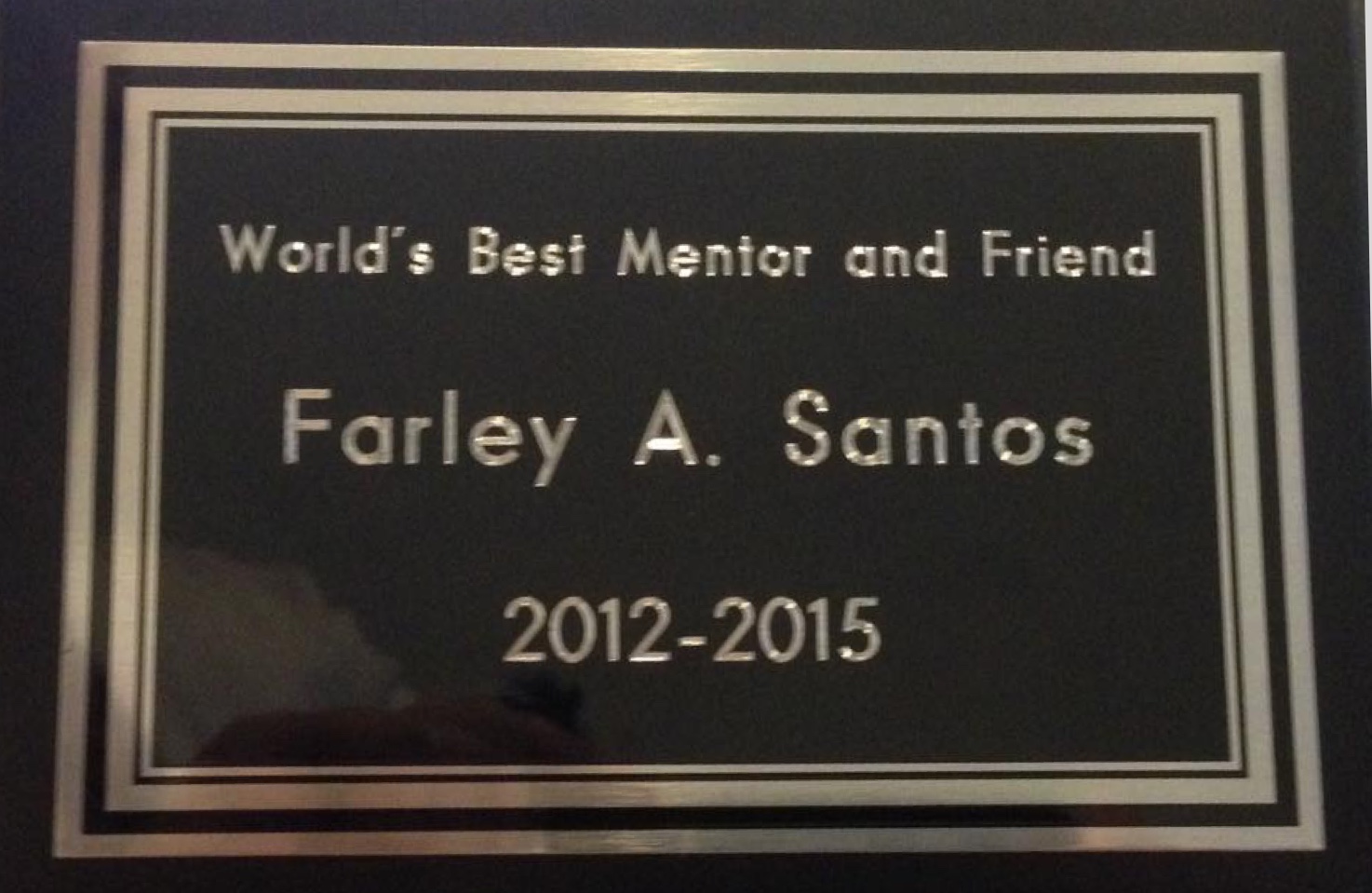
MY BEST DAYS ARE WITH MY MENTOR
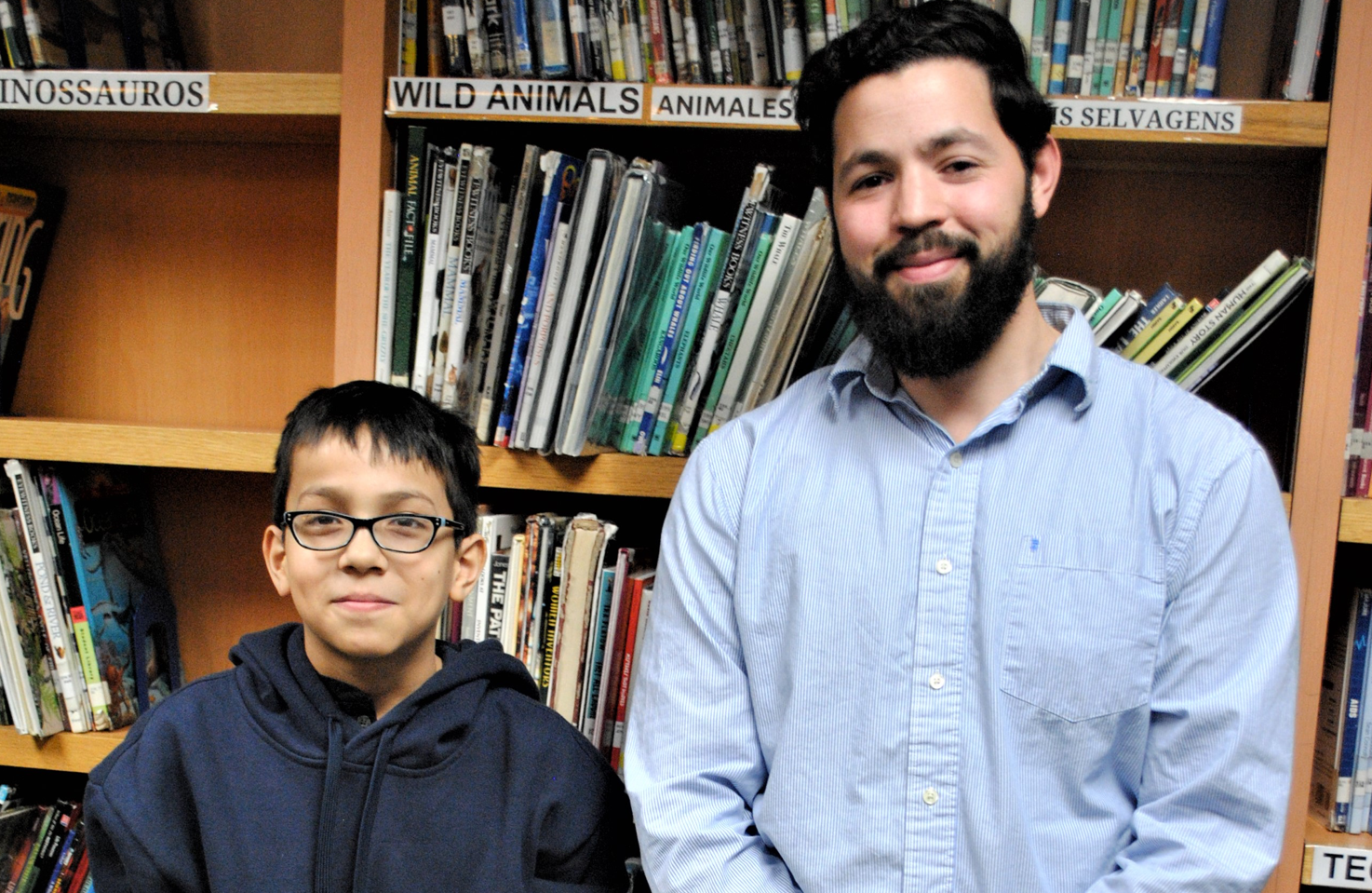
As mentor for Danbury Schools and Business Collaborative (DSABC), Oscar Rodriguez looks back on his childhood, he seems to have but one regret: that he didn’t have a mentor.
Rodriguez, who works in Human Resources at Boehringer Ingelheim, said he remembers the days when mentors were allowed to bring in fast food hamburgers and soda for their students. He also remembers how happy and excited the students were to have a mentor
“I wonder how my life would have been different, or better, if I had a mentor,” Rodriguez said.
Despite not having a mentor himself, Rodriguez said when the opportunity to become a mentor presented itself through his workplace, he thought about the difference being a mentor can make for a student.
“Even though I didn’t have the experience of being mentored, I said – let me make myself available. These kids are our future, and I want to help them,” Rodriguez, a 2007 graduate of Danbury High School, said. “It’s a good feeling to have someone to talk to you can trust.”
Two and a half years ago, Rodriguez became a mentor to Andrew Lima, now a sixth-grader at Rogers Park Middle School.
Andrew was very shy when he first met Rodriguez. He found school and homework stressful and he didn’t seem to want a mentor at first. Rodriguez said he stayed relaxed and just found games to play and kept it light.
“I asked him questions, but there wasn’t a lot of conversation,” Rodriguez said. But since the two having been meeting at school once a week for about 40 minutes over the past several years, Andrew is a different kid. He is no longer shy and anxious, and he uses the word “brave” to describe himself.
“We developed a relationship, a friendship where we can trust each other and it built from there,” Rodriguez said.
Andrew’s first impression of Oscar is that his mentor was calm and he felt no pressure to just be with him.
“My best days are my days with Oscar,” Andrew said. “I don’t have to worry about homework, I can have fun and I calm down. I’ve become more open-minded and brave. Having a mentor can help me be successful. It’s somebody to give advice and encouragement not to give up.”
Rodriguez said that Andrew is very conscientious when it comes to schoolwork, so he focuses their meetings on activities that reduce Andrew’s anxiety about school.
“Andrew is very accountable. He’s bright and he has a bright future. He’s more outgoing now and has friends. He’s very confident and has grown as if he were a butterfly,” said Rodriguez. “You just have to put time and effort and the more time you spend, the closer you get. Once Andrew knows the capabilities he has, the possibilities are endless. He just needs to know it – and some kids don’t have that.”
Rodriguez said that mentoring experience has also helped him. He said he looks forward to taking time out of his week to help Andrew and give him encouragement.
“I look forward to taking this time and I notice a difference for myself,” Rodriguez said.
A MENTOR LISTENS – THEY ‘GET’ YOU
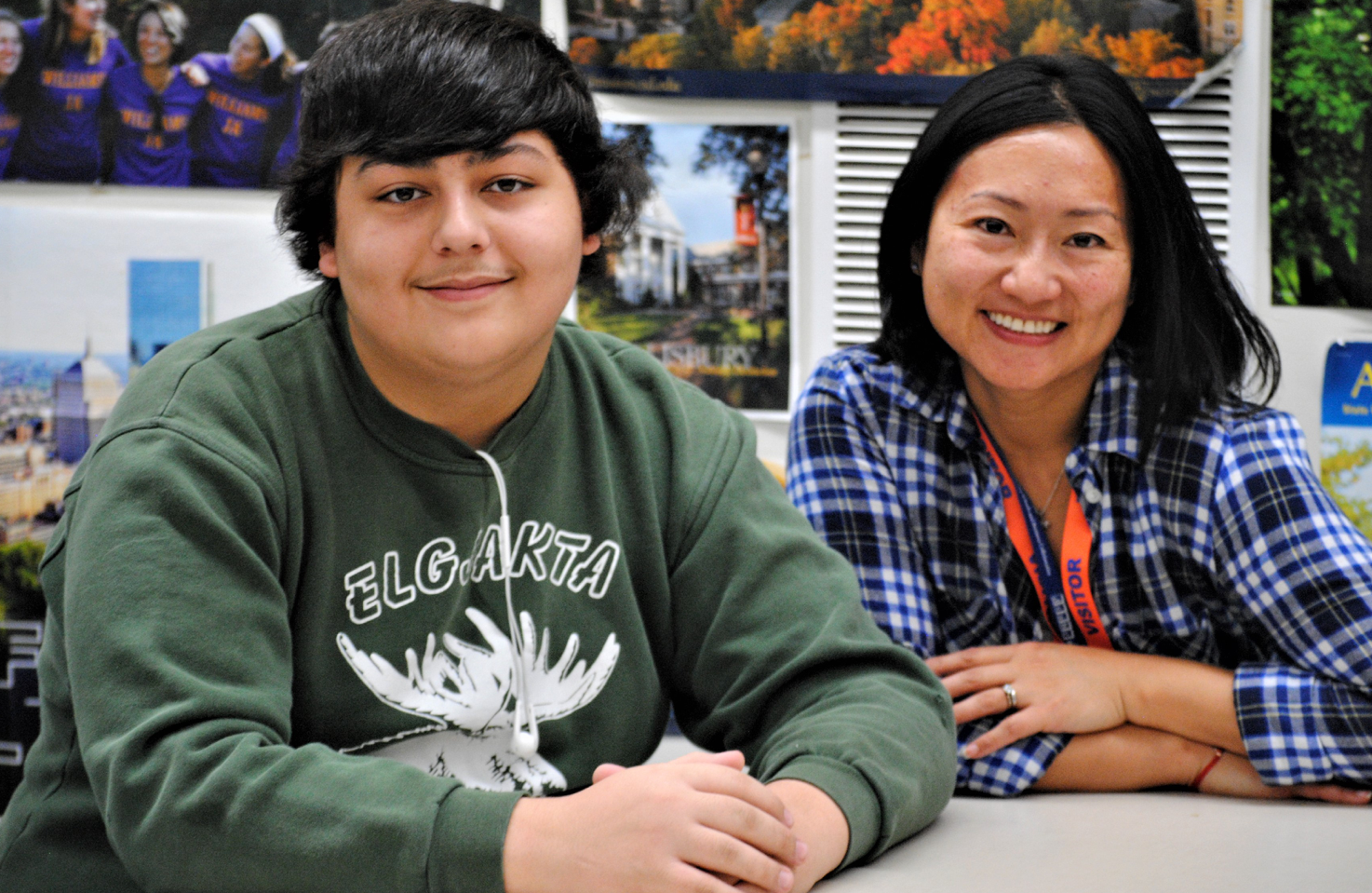
For the past six years, Danbury High School junior Christian DeBarros has had a mentor from Danbury Student and Business Connection (DSABC) – so long, he says, he barely remembers life without her.
Sherry Cheng-Dexter, a finance project manager at Cartus Corporation, met Christian when he was a fifth-grader at the Academy of International Studies, Danbury’s magnet elementary school. She had always been involved in volunteering, at animal shelters and with Big Brothers and Sisters. However, when a colleague told her about DSABC’s mentoring program, Cheng-Dexter thought it would be a great experience.
Part of the program’s training is learning about what a mentor is – someone who doesn’t discipline, but instead sets a good example and brings a positive attitude and good listening skills.
During a recent mentoring session, Christian recalled when he did “something dumb” in the sixth grade and Cheng-Dexter’s positive attitude and good listening skills were exactly what set him back on the right path. The teen said it is a huge benefit in his life to have someone who is encouraging and supportive and not judgmental to talk to about issues.
“She said that I needed to improve and do better,” said Christian, who also said he’s more open-minded and less shy because of his relationship with a mentor. Even though Christian comes from a supportive family, he said a relationship with a mentor is different than with the other adults in his life.
“The title says everything. A mentor listens – they ‘get’ you. It’s their job to listen and pay attention. Parents and teachers have a different job and they want you to do what they want you to do.”
As a result of being able to express himself without discipline or judgment, Christian has grown to be more mature, responsive and appreciative, Cheng-Dexter said.
While their one-hour meetings at the school during the academic once centered around games such as Chutes and Ladders, Uno and Crazy Eights, the meetings this year are more focused on Christian’s future – and educating Cheng-Dexter on the latest technology.
“He keeps me young showing me the latest apps,” Cheng-Dexter said. “And we talk about his future beyond high school. I’m always encouraging him to do what he likes.”
“I like history and am thinking of maybe becoming a professor,” he said.
Cheng-Dexter immediately said that the biggest change in Christian over the past five years is that he’s now taller than she. But upon deeper reflection, Cheng-Dexter said his biggest change is that he has learned a greater appreciation for the gifts in his life.
“He comes from a good family, and he knows he’s lucky,” she said. “It’s good to see him appreciate things. He’s very sweet and he’s always respectful.”
Cheng-Dexter doesn’t like to take credit for Christian’s positive growth and sometimes thinks he doesn’t need a mentor anymore. But Christian says the relationship has given him more confidence and made him more open, and he thinks about things more clearly.
“I have seen through Christian that you can learn from a mentor to be a better person overall and appreciate things,” said Cheng-Dexter. “But as a mentor I’ve learned things too: I’ve learned to be more patient and really listen to what he says. It’s been great watching him grow into a young man.”
HAVING A MENTOR OPENED MY SHELL
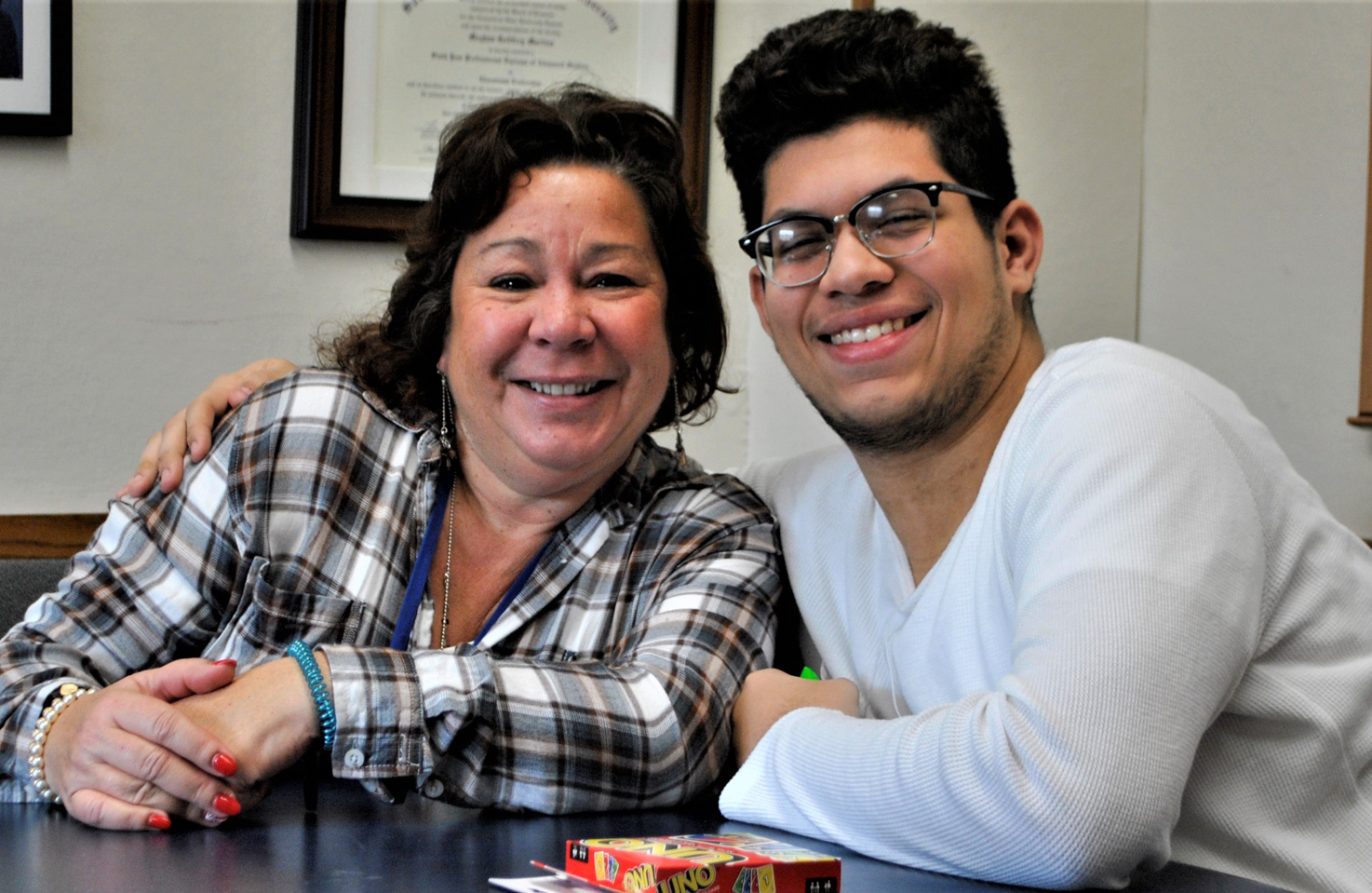
When Jhasuel Espinal first met his DSABC mentor, Karen Ledan, he was a shy and quiet second grader at Stadley Rough School. He said he didn’t really understand why Ledan, a complete stranger to him, was visiting him at school.
Now - nine years later, the 16-year-old junior he can’t imagine a week going by without his Danbury Student and Business Connection (DSABC) mentor visiting him at Danbury High School to talk about school or play a game of Yahtzee.
Jhasuel said although that initial meeting was awkward, he knew Ledan was kind and funny, and he warmed up to her quickly.
“I liked her right away,” he said. “She’s mostly a listener and gives advice.”
Ledan, who works in the records unit at the Danbury Police Department, had thought for a long time about mentoring, but it wasn’t until her son was in grade school that she saw a need for some students to have an adult with whom to spend time.
“I saw that some kids had no one to talk to,” she said. “The best thing about mentoring is just knowing that you are helping someone and just to be a friend to someone.”
But Ledan has found that the mentor program has also benefited her. She admitted to sharing her enthusiasm for the program at work and a colleague once asked if the program benefited her more than the student. Ledan laughed and said, “we help each other.”
Ledan said Jhasuel is easy to mentor because of his positive personality and the easy rapport they have developed. Her greatest challenge was establishing a relationship with a shy little boy who didn’t like to talk; she said Jhasuel has matured in so many ways.
“It took me a long time to see the difference I made,” Ledan said. “But he wasn’t a challenge, although he didn’t talk at first. I just tried to be fun and let him trust me in his own time so he could open up. Now if something is wrong, he’ll usually talk about it. And he usually chooses the right path.”
Jhasuel and his mentor agree that they have more than a few similarities, as they are both sensitive, humorous, respectful and sometimes sarcastic.
“I’m not hip in a lot of ways,” Ledan confessed, but having a son not much older than Jhasuel has helped her relate to him.
Jhasuel, who works part time as a decorating assistant, likes math and plans to study computer engineering after high school. Looking back on his years with a DSABC mentor, Jhasuel said that life without having a mentor would be more confusing and it would be harder to stay on track.
“The mentoring program has slowly cracked my shell open,” he said. Every year, Ledan lets Jhasuel decide whether to continue meeting for another school year, and every year he says yes.
“She’s fun. She’s a good friend to have,” he said. “I like that she is calm and cool to hang out with. I would say to someone who is getting a mentor: don’t judge the person right away.”
According to Ledan, the best part of being a mentor is “being able to make a difference, make someone’s life a little different, a little better. Everybody should be a mentor once in their life. It would help so many people. You want to think you are the best mentor, but like a parent, you just do the best you can and hope you make a difference.”
JUST BEING THERE MAKES ALL THE DIFFERENCE
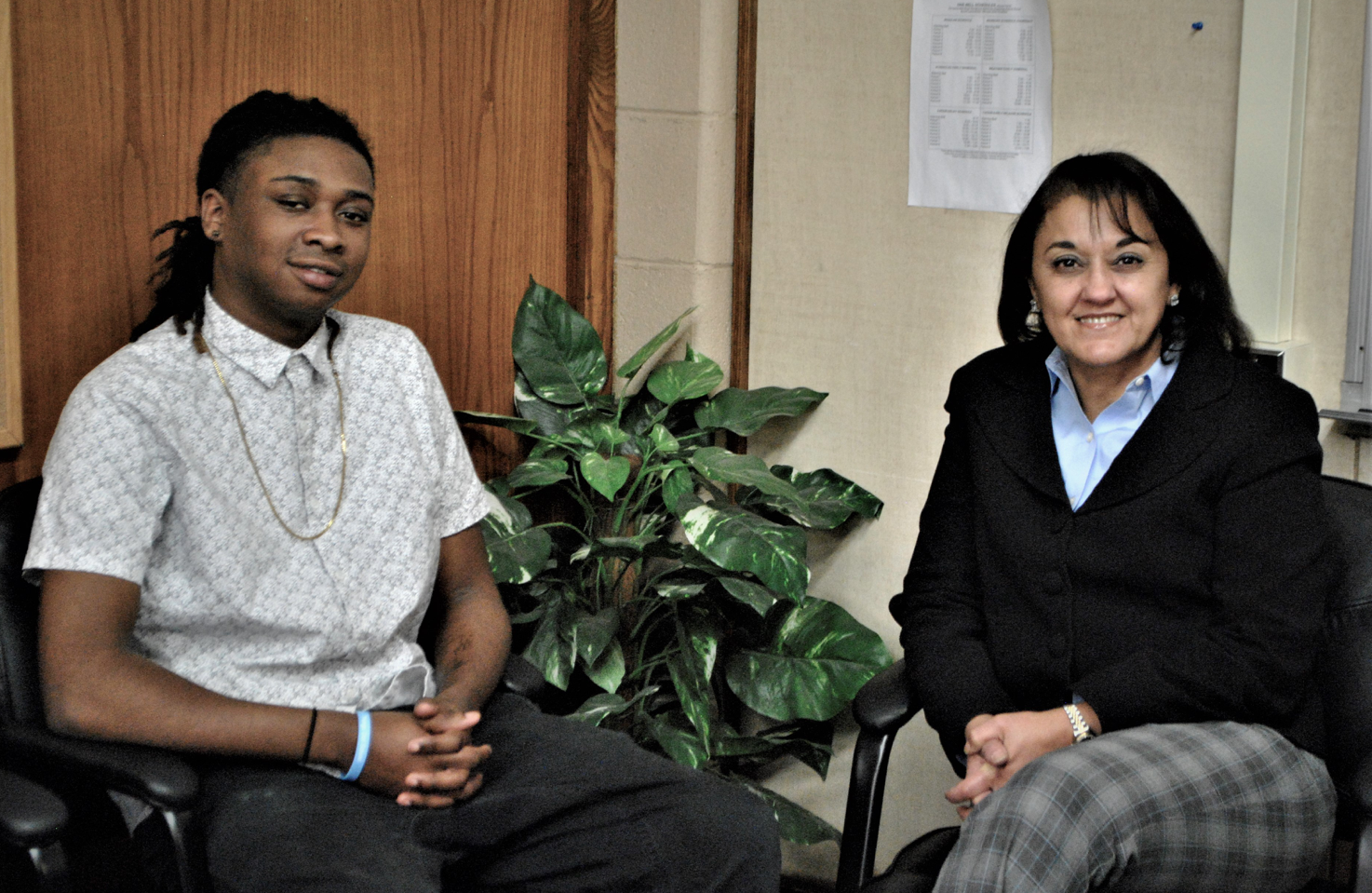
What started out as a weekly game of checkers more than 10 years ago has turned into a lifelong friendship for Danbury High School senior Ke’Shown Brown and his Danbury Student and Business Connection (DSABC) mentor Sanaa Almarayati.
Ke’Shown was in second grade at King Street School when Almarayati, a manager of legal services at Praxair in Danbury, came into his life. He said he wanted a mentor, someone to talk to and learn from. But Almarayati found it was she who learned from Ke’Shown, starting with the art of checkers.
“He taught me how to play. I couldn’t understand this kid beating me. But he’s good; he has strategy,” Alamarayati said.
A Danbury native, Ke’Shown plays the drums and keyboard, likes math and plans to enroll in the automotive program at Naugatuck Valley Community College. He said his mentor has helped him and been there through difficult times. Raised by his grandparents, Ke’Shown lost his mother in 2014 and his grandmother last year – and Almarayati was there through it all. Her constant support and guidance kept him motivated, Ke’Shown said.
“She motivates me to do things I wouldn’t do, like going to college,” he said.
This year, his last in high school, has been less about checkers and more about Ke’Shown’s future. Almarayati said she has seen him grow and mature – and she finally sees the culmination of all the advice, conversations and guidance.
“I see a young man who has matured with great confidence. This year there’s been more to talk about because there’s transition,” she said. “Ke’Shown is more open this year, and we’ve been talking about his next step after high school and we talked about his options. I’ve seen him go through a lot of life challenges - he’s always thinking out loud and he’s mature and very good at communicating.”
Almarayati said it took years before realizing the positive impact she’d had on Ke’Shown: “I didn’t know I made a difference until recently,” she said. “You never know what a child needs, so the best thing is just being there. He’s telling me now about things that clicked with him. He’s really listened and appreciated things I’ve said to him.”
“And her advice I can pass on to other people,” Ke’Shown said. When a friend recently went through a difficult time, Ke’Shown immediately remembered something Almarayati had said to him: “hang around with the right people – not the people who bring you down.”
Almarayati, who started at Praxair in 2005, had worked at other corporations that encouraged community volunteering, but it was at Praxair that she learned about DSABC.
“It’s nice to be one on one with a student,” she said, but her early experiences weren’t as fruitful as expected, as she had three students who didn’t stay with the program. “I thought this might be a sign. But they said to try one more. Then Ke’Shown came along, and it’s been great.”
For all of those years, both Ke’Shown and Almarayati made the commitment to meet once a week during all of those school years. Almarayati said she had heard sometimes students don’t want to talk or they don’t want to see their mentors anymore. She said Ke’Shown was there waiting every week.
“I could rely on him too,” she said. “It makes a huge difference. He’s like my son now. I think we will be in contact forever.”
IT’S ENHANCED MY LIFE
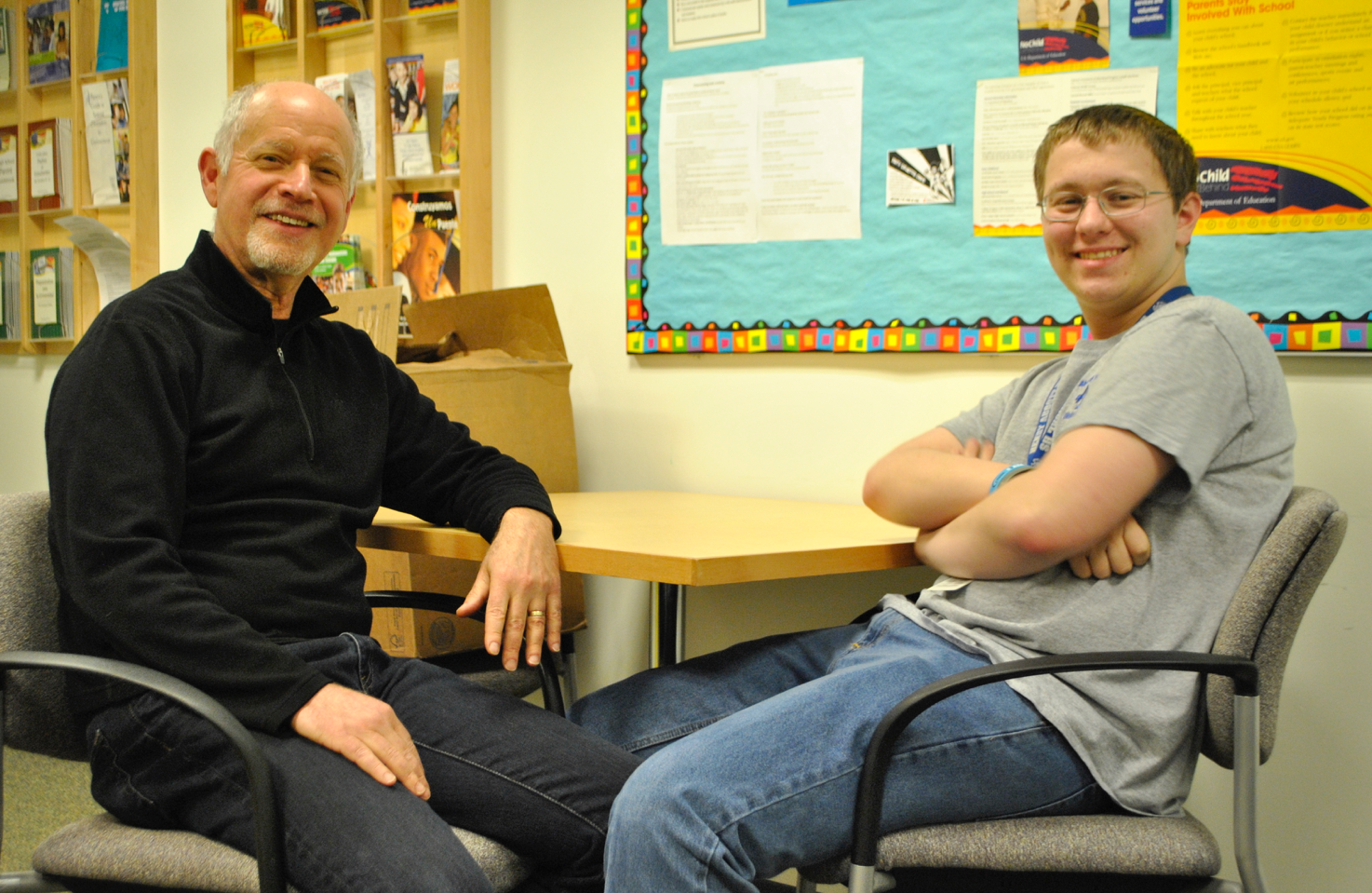
When Ben Ritchie was in third grade, he tended to get in trouble when he got angry. So his resource teacher recommended that he have someone work with him outside of class. That’s when Danbury Student and Business Connection (DSABC) mentor Keith Wolff walked into Ben’s life.
Despite getting the cold shoulder as Ben played with Legos, Wolff continued to show up every week at Shelter Rock School. It took a month before Ben realized that Wolff wasn’t going away. Then he started to like the attention and started to like Wolff because “he’s funny.”
Eight years later, the two are clearly lifelong friends. Ben, a junior studying plumbing at Henry Abbott Technical High School, meets once a week with Wolff. Wolff and his wife have lived in Brookfield for 30 years and have two children and two grandchildren. He originally started as a literacy volunteer at Shelter Rock 11 years ago.
“I’m caregiving and I wanted to do something with social value and thought this would be a really good fit,” said Wolff of the mentoring.
Wolff said his initial meeting with Ben eight years ago was a little rough: “He was little standoffish,” “I ignored him,” Ben said with a smile. The Legos were a connecting point, and the two have come a long way since that initial encounter. Ben respects Wolff and Wolff respects Ben.
The two have advanced from Legos to Chess, and they even analyze the stock market. They have talked about Ben’s interest in pursuing a career in civil engineering.
“Ben has come a long way,” Wolff said. “He’s mature. He’s really bright and he does well in school.” Wolff said there was never a specific goal to their meetings, rather it was an opportunity for Ben to have an adult to talk with who could guide him into a good direction. The two have discussed how to handle emotions in tough situations, challenges of school, and even career goals.
“It’s fluid as to how the relationship develops. You look at the child’s needs,” Wolff said. “It goes to being there as a non-judgmental friend. I try to give Ben the confidence he can say and be anything he wants.”
Ben said the relationship has changed his life.
“I don’t have anger issues anymore,” Ben said. He’s stayed out of trouble at school and learned to enjoy reading more.
Wolff said he thinks the program has made a lasting impact on him too.
“It’s enhanced my life,” he said. “I found more value to what I do because it grounds me. You sometimes forget what’s important. I look forward to seeing Ben, and I enjoy impacting his life in a positive way.
“It’s like being a parent,” Wolff said. “It’s a rewarding experience. We’re always going to be friends.”